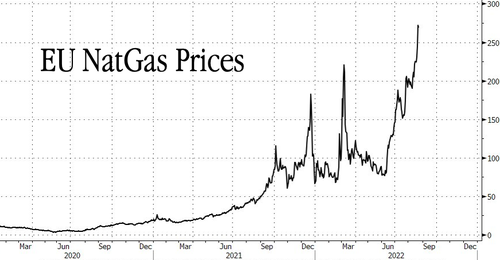Belgian PM Warns “Next 5-10 Winters Will Be Difficult” As Energy Crisis Worsens
Belgian Prime Minister Alexander De Croo might have spilled the beans about the duration of Europe’s energy crisis. He told reporters Monday, “the next 5 to 10 winters will be difficult.”
“The development of the situation is very difficult throughout Europe,” De Croo told Belgium broadcaster VRT.
“In a number of sectors, it is really difficult to deal with those high energy prices. We are monitoring this closely, but we must be transparent: the coming months will be difficult, the coming winters will be difficult,” he said.
The prime minister’s comments suggest replacing Russian natural gas imports could take years, exerting further economic doom on the region’s economy in the form of energy hyperinflation.
Europe faces a historic energy crisis exacerbated by Russia’s war in Ukraine (and Western sanctions that have backfired). The continent heavily relies on Russia for its energy needs, importing about 40% of NatGas. At just 20% capacity with risks of going to zero next month, Russian supplies via Gazprom’s Nord Stream 1 have sent NatGas and power prices to record highs this week.
European NatGas prices soared to a record high of 277 euros per megawatt-hour on Monday, about 15 times the average summertime price. Leon Izbicki, a commodity analyst at Energy Aspects Ltd., told Bloomberg if NS1 flows come to a halt in September, prices could rise to 400 euros per megawatt-hour.
Bloomberg’s commodities reporter Javier Blas tweeted a map of day-ahead electricity prices across Europe. He called the prices “eye-watering, with lots of countries setting record highs for today.”
MAP OF THE DAY: Day-ahead electricity prices in Europe are eye-watering, with lots of countries setting record highs for today. Notable to see the Nordics close to €400 per MWh, and Germany at €600. Before 2020, anything above €75-100 was considered expensive| #EnergyCrisis pic.twitter.com/RyTrbJ4Mxl
— Javier Blas (@JavierBlas) August 23, 2022
The shift from Russian NatGas supplies has backfired for the 19-nation eurozone. Germany, Europe’s largest economy, could be headed for a recession that will bring down the rest of the continent.
De Croo said Belgium and the eurozone must “support each other in these difficult times.”
Europe’s dark winter could be a yearly occurrence throughout this decade if the prime minister is right. The widely optimistic idea that the bloc could replace all Russian Natgas imports this year was a farce, and now European households must pay exorbitantly high power costs, forcing millions into energy poverty.
Even though Germany admitted that it was a terrible mistake to become so dependent on cheap Russian energy — like a drug — how long does it take for Berlin to go back to its dealer [Moscow] for resupplies and defect from the rest of Europe because it doesn’t want to freeze to death this winter nor crash its economy.
Tyler Durden
Wed, 08/24/2022 – 05:45

